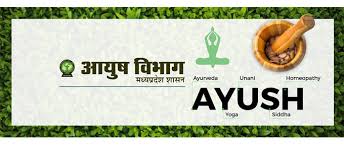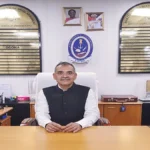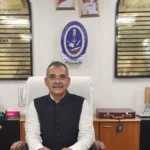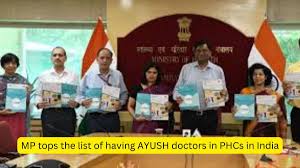MP Tops the List of Having AYUSH Doctors in PHCs in India
Introduction to AYUSH in PHCs
Madhya Pradesh (MP) has recently achieved a significant milestone by topping the list for having the highest number of AYUSH doctors stationed in Primary Health Centres (PHCs) across India. This development is part of a broader effort to integrate AYUSH (Ayurveda, Yoga, Unani, Siddha, and Homoeopathy) systems of medicine into mainstream healthcare. The initiative aims to enhance the accessibility and quality of healthcare services, especially in rural and underserved areas.
Significance of AYUSH Integration
The integration of AYUSH practitioners into PHCs reflects the Indian government’s commitment to promoting traditional medicine alongside conventional medical practices. By positioning AYUSH doctors in these health centres, the government aims to provide a holistic approach to healthcare that includes preventive, promotive, and curative aspects of traditional medicine. This approach is expected to improve patient outcomes and increase the efficiency of health services.
Efforts to Promote AYUSH in MP
Madhya Pradesh’s success in deploying AYUSH doctors is attributed to several state-specific initiatives. The state government has invested in training programs and infrastructure to support AYUSH practitioners. Additionally, there has been a concerted effort to integrate AYUSH practices with modern healthcare strategies, ensuring a comprehensive approach to patient care. These measures have positioned MP as a leader in incorporating traditional medicine into the public health system.
Challenges and Future Directions
Despite this achievement, challenges remain in ensuring the effective utilization of AYUSH services. There are ongoing efforts to address these challenges, such as improving the integration of AYUSH practices with modern healthcare protocols and enhancing the training and support provided to AYUSH practitioners. Looking ahead, there is a focus on expanding these initiatives to other states and further strengthening the role of AYUSH in India’s healthcare landscape.

Why This News is Important
Promoting Holistic Healthcare
The inclusion of AYUSH doctors in PHCs underscores a shift towards a more holistic approach to healthcare in India. By integrating traditional medicine with modern practices, the healthcare system aims to offer comprehensive treatment options that address a wider range of patient needs. This approach not only broadens the scope of available treatments but also enhances patient satisfaction and health outcomes.
Improving Accessibility to Healthcare
Madhya Pradesh’s achievement highlights the potential for increasing healthcare accessibility in rural and remote areas. AYUSH doctors are often deployed in underserved regions where conventional medical facilities may be limited. Their presence in PHCs helps bridge the gap in healthcare services, providing essential medical care to populations that might otherwise have limited access.
Encouraging State-Level Innovations
MP’s success serves as a model for other states to follow. By showcasing effective strategies for integrating AYUSH doctors into PHCs, MP provides valuable insights into how other regions can implement similar initiatives. This can lead to a nationwide enhancement of healthcare services and the promotion of traditional medicine across India.
Enhancing Healthcare Workforce Utilization
The deployment of AYUSH doctors in PHCs also represents a strategic use of the healthcare workforce. By leveraging the skills of AYUSH practitioners, the government can optimize the delivery of healthcare services and ensure that resources are utilized effectively. This not only improves service delivery but also supports the professional development of AYUSH practitioners.
Supporting Government Health Policies
This development aligns with broader government health policies aimed at strengthening primary healthcare systems. The integration of AYUSH doctors into PHCs reflects the government’s commitment to diversifying healthcare options and improving the quality of care. It also supports the implementation of policies that promote the use of traditional medicine within the public health system.
Historical Context: Background of AYUSH Integration in India
Introduction of AYUSH in Indian Healthcare
The AYUSH system of medicine has been an integral part of India’s healthcare landscape for centuries, with roots tracing back to ancient practices. The formal integration of AYUSH into the modern healthcare system began in the early 2000s with the establishment of the Ministry of AYUSH in 2014. This ministry was created to promote and regulate AYUSH practices and ensure their integration with contemporary medical practices.
Government Initiatives and Policies
The Indian government has implemented various policies to promote the use of AYUSH medicine. The National Health Policy of 2017 emphasized the integration of AYUSH systems with conventional healthcare to provide comprehensive health services. Additionally, schemes such as the National AYUSH Mission have been launched to support the development and integration of AYUSH practices at the grassroots level.
Growth of AYUSH Infrastructure
Over the years, there has been significant growth in the infrastructure supporting AYUSH practices. This includes the establishment of AYUSH hospitals and clinics, the training of AYUSH professionals, and the development of research and education programs. These efforts have contributed to the growing presence of AYUSH practitioners in public health systems across India.
Recent Developments
In recent years, there has been a renewed focus on integrating AYUSH practitioners into PHCs and other healthcare settings. This is part of a broader strategy to enhance the availability of traditional medicine and provide a more holistic approach to patient care. The success of states like Madhya Pradesh in deploying AYUSH doctors highlights the ongoing evolution and expansion of AYUSH practices within India’s healthcare system.
Key Takeaways from “MP Tops the List of Having AYUSH Doctors in PHCs in India”
| Serial Number | Key Takeaway |
|---|---|
| 1 | Madhya Pradesh leads in the number of AYUSH doctors stationed in PHCs in India. |
| 2 | The integration of AYUSH doctors in PHCs aims to provide holistic and comprehensive healthcare services. |
| 3 | MP’s success demonstrates effective state-level strategies for promoting AYUSH practices. |
| 4 | The presence of AYUSH doctors enhances healthcare accessibility in rural and remote areas. |
| 5 | This development supports broader government health policies and encourages the use of traditional medicine. |
Important FAQs for Students from this News
1. What is the significance of MP topping the list for AYUSH doctors in PHCs?
- Madhya Pradesh’s achievement in having the highest number of AYUSH doctors in Primary Health Centres (PHCs) highlights the state’s commitment to integrating traditional medicine into mainstream healthcare. This approach aims to provide a more holistic and accessible healthcare service to rural and underserved areas.
2. What are AYUSH systems of medicine?
- AYUSH stands for Ayurveda, Yoga, Unani, Siddha, and Homoeopathy. These are traditional systems of medicine that have been practiced in India for centuries. They focus on holistic health, preventive care, and natural treatments.
3. How does the integration of AYUSH doctors benefit rural areas?
- The deployment of AYUSH doctors in rural areas helps bridge the gap in healthcare services where conventional medical facilities might be limited. It provides local populations with access to traditional medicine and comprehensive healthcare.
4. What are the main challenges in integrating AYUSH practices into mainstream healthcare?
- Key challenges include ensuring effective coordination between traditional and modern medical practices, providing adequate training for AYUSH practitioners, and addressing any discrepancies in treatment protocols.
5. How does this development support government health policies?
- The integration of AYUSH doctors into PHCs aligns with the Indian government’s health policies that aim to strengthen primary healthcare systems and promote a diverse range of treatment options. It supports the broader goal of improving healthcare access and quality.
Some Important Current Affairs Links

















